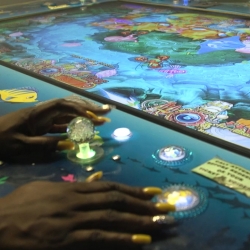
Fish games for real money proved popular in North Carolina, but the legislature said they are illegal.
North Carolina law enforcement continues to crack down on “fish games”, a form of table-mounted video games that pay real money to players. For the past couple of years, officials and business owners could not agree on whether fish game tables are legal or illegal.
The Charlotte Observer ran a story about fish games that struck a chord with State Senator Andy Wells. Over the past summer, a consensus formed in the North Carolina state legislature that fish games are more akin to Internet sweepstakes cafes than arcade games. That state senator sponsored an anti-fish games bill in August which passed into law in September.
In the months since, local officials at the county and city levels of government have used the law to crack down on fish game tables. Those in other parts of the United States might be wondering what fish games are, so we take a lot at the issue over the past couple of years.
Fish games are a form of table-mounted video game. Las Vegas residents might recognize them as the kind of Gamblit games found in MGM Grand’s Level Up. Those who frequented arcades in the 1980s and 1990s might compare the table-mounted games to the old Gauntlet video game.
Charlotte Observer on Fish Games
The main difference between arcade games and fish games is one has payouts in real money. The Charlotte Observer described fish game tables as “garish aquatic creatures swim across a 55-inch TV screen embedded in the six-foot game table. If you shoot and kill one — sometimes a whale, a sea dragon, or monster crab — you win points.”
The article continues, “Points are redeemable for cash or more credits to keep playing.”
The money prize aspect is a huge problem for North Carolina law enforcement. While people can go a Chuck E. Cheese or Dave & Buster’s to play video games for prizes, they do not pay out cash. North Carolina officials warn local busineses their fish game tables are illegal now.
General Statute Section 14-306
Sen. Andy Wells introduced a bill in August 2018 to clamp down on fish game tables. The bill led to changes in the North Carolina General Statute (sections 14-306.4 and 14-306.1A), giving law enforcement at the city and county level the authority to crack down on fish games and sweepstakes cafes.
The changes to the statute were passed in September and went into effect on October 2018. Since then, local officials across the state have moved to shut down fish game sites. Police in Burlington warned business owners to stop operating fish games on their premises.
Lt. Alan Balog of the Burlington Police Department said, “The sweepstakes and the fish games have always operated in a gray area of the law where there’s confusion both in the community and within courts and the police about what’s legal and what’s not, but now we have that clarification to move forward with enforcement.”
2017 Greensboro Fish Games Policy
As early as June 2017, Greensboro police were cracking down on businesses that housed fish games. A spokesman for the Greensboro Police Department claimed their investigators had tied fish game tables to violent crimes. The charges justified a ban against the games at local businesses at a time when fish games were not deemed illegal.
At the time, Greensboro sent letters to 37 local businesses, calling for them to cease-and-desist from offering real money fish games to customers. The letter said, “Any machine which, for the payment of money is operated in such a way that the operator receives a cash payout of any kinds, irrespective of whether the game requires skill or dexterity.”
“Pattern of Violent Crimes”
Isaah Florence, a cashier at a business that had fish game tables, told WFMyNews Greensboro at the time, “It’s a fun and innocent game. It just involves money in it — and law enforcement doesn’t like anything that involves cash money.”
Rick Stevens, an attorney for the Guilford County Sheriff’s Department, said disagreed with Florence’s assements. Stevens said, “Greensboro’s seen a pattern of violent crime that’s been associated with these businesses.”
The attorney added, “Walking in with a certain amount of money and leaving with many times more than that is going to be the hallmark of what constitutes an illegal gaming operation in North Carolina versus one that’s lawful.”
How Fish Game Tables Work
Saying the games are highly addictive, Mr. Florence added, “It’s sort of like sweepstakes. It’s a game where you put your money in, whatever you want to put in. There are different types of tables you get to play on.”
The cashier added, “You shoot at the fish, whether it’s the big fish or little fish, and then if they blow up, however much the value was you get that as ammo and you keep shooting or you can cash out.”
Do Fish Games Lead to Violent Crimes?
Fish game tables sound like video games for real money. Nevada has skill-based gambling machines from Gamblit, Konami, and Game Co. The Level Up gaming lounge at the MGM Grand is full of games like those described by the North Carolina police.
If you talk about video games for money prizes, fish games are not unlike Esports. In electronic sports event, pro video game players take part in tournaments for real prize money. Corporations sponsor Esports teams, which has grown into a billion dollar business.
Fish games might be illegal gambling in North Carolina. Problem gamblers might become addicted to fish games, or the business owners who offer them might not pay their taxes. Whatever the case, it seems absurd to claim fish games lead to violent crimes. One might as well claim arcades or Dave & Buster’s leads to a pattern of violent crimes.
